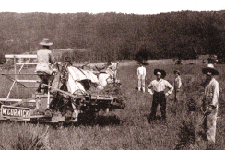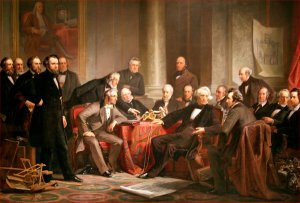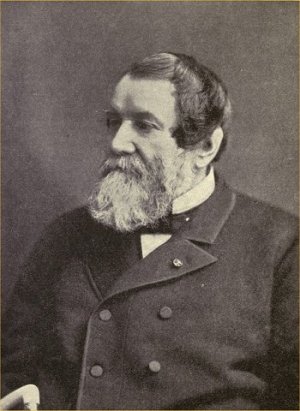Before his invention, a farmer could harvest only one to three acres a day using a scythe* (SIGHTH). With the invention, a farmer and a helper could harvest 12 acres a day!
He had invented the reaper when he was only 22 years old. His father had tried for 15 years to invent a harvester, but had not been able to build one successfully. He had made a lot of mistakes, but young Cyrus learned from his father's mistakes. If a strand of wheat got tangled in the machine, he would get down on his hands and knees to look, until he found out exactly why it had tangled. He asked his father if he could take over working on the invention. His father gave his permission, but thought it was hopeless.
In just 2 months he was able to make a harvester. Some said it looked like a combination of a flying machine, a wheelbarrow, and a carriage.* When he tested it, he could harvest an acre an hour. (Remember, the old by-hand speed was one to three acres a day.)

He invited farmers to come and watch him work. They thought it was just entertainment.* They would watch him harvest, and then they would go home and use their old hand scythes. They would say things like, "I'm running a farm, not a circus."
Cyrus decided he would get some of the successful farmers to test his reaper. Maybe they would talk the other farmers into buying a reaper of their own. He just could not interest them, so he decided to work on it some more so it would work even better. He put a blade on it which would chop the wheat off cleanly.
In 1843, another man, who was also making a reaper, challenged him to a contest. They would see who could cut the most wheat. On the day of the contest, it rained. The other man's reaper jammed and wouldn't cut, but McCormick had designed his to cut in damp weather.

That year he sold 29 reapers and each year after that he sold more and more. By 1850, he was selling 5,000 reapers a year.
His company became the International Harvester Company in 1902.
At the time of his death in 1884, enough grain was shipped from Chicago to bake 10 billion loaves of bread a year, thanks to McCormick's invention.

"Men of Progress" painted by Christian Schussele. (flickr Cliff 1066)
Cyrus McCormick 4th from left
Larger image
Cyrus McCormick 4th from left
Larger image
This biography by Patsy Stevens, a retired teacher, was written in 2001.


 A frequent question:
A frequent question: